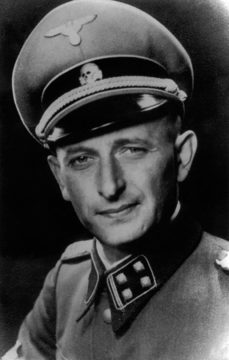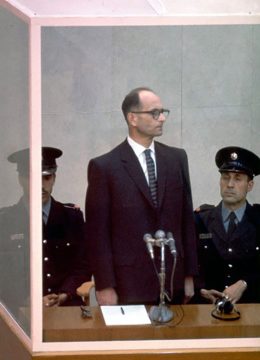by Christopher Horner

Adolf Eichmann was hanged in Jerusalem on June 1st 1962, a little after midnight. He had been found guilty by an Israeli court of ‘crimes against the Jewish people’ and ‘crimes against humanity’. One of the reasons he is still remembered – apart from the sheer scale of the crimes committed by him – is the he became the subject of a famous book: Eichmann in Jerusalem, by Hannah Arendt. It is a troubling and controversial text, but, I think, one that holds a good deal of interest for us today. For it hs something to say about the modern subject and the way we live today. Eichmann’s significance takes us to the heart of Arendt’s central concern – the very possibility of living together politically in the contemporary world. This is an issue of obvious concern to all of us.
The Banality of Evil
Arendt’s term for what she saw and heard in Eichmann has become famous: ‘The banality of evil’: Arendt’s identification of Eichmann as a somehow thoughtless man, one who replaced reflection on the murder he was committing by clichés and formulae has become famous, so much so that it too risks joining the army of clichés, another formula to replace thought. Yet the question remains: what was it about Eichmann that she saw as significant? What Arendt saw in Eichmann was something that remains present and troubling today. This was the abdication from genuine thinking and judging that she named, an absence that accompanied him through his role in the central crime of the Twentieth Century. The high-ranking Nazi, an agent of genocide was just a colourless bureaucrat. And the manner in which this functionary did evil was as far from the demonic or sadistic as one could imagine –it was banal indeed. Arendt did not claim that evil is a banal concept, but that those who sit in offices and bring it about it are just that: not monsters but ordinary people who do not think. This banality, or ordinariness, is the disturbing reality that makes Eichmann a kind of negative exemplar, a representative figure for our times. The trial gave Arendt the opportunity to encounter the phenomenon right in front of her eyes.
The crimes of the Nazi state and its various accomplices across Europe are well known in outline. Accounting for those crimes, for the people who actually did the deeds, remains ‘thought denying’ indeed: one struggles to comprehend it. One approach is to see the Nazis, particularly the ones with power and influence, as monsters deformed by anti Semitism and lust for destruction. This has the satisfying effect of appearing to match the deeds of ‘radical evil’ (Kant) with suitable terms, but it has its limitations as an explanation: they did what they did because they were evil. Apart from its circularity, it lacks plausibility as an explanation for mass death across a continent on an industrial scale, for even if the Nazi leadership can be accounted for in such terms it stretches credulity to suppose the myriads that did their bidding were all either psychopaths or guiltless dupes. And another effect of this kind of ‘explanation’ is that it releases us from further thought, since they were somehow ‘born evil’. This is not the way Arendt came to see Eichmann. In him she saw a man who far from being some monster of depravity and insane fanaticism was a functionary, a function of the Nazi state. For Arendt, Eichmann’s culpability lay in the way he had allowed himself to commit such acts, while seeing himself as an ordinary man doing his duty as an official of the state. Arendt found this ‘ordinary’ quality more disturbing than the ‘Nazi monster’ one might have expected. And she noted his failure to think about what he was doing. He was a thoughtless man.
This does not mean he was stupid. He performed quite skilled tasks, oversaw numerous other bureaucrats and functionaries, and acted with a good deal of resource and effort when it came to ensuring the successful liquidation of Jews in obedience to the Fuhrer’s will. This takes us to a central problem of today. The kind of thoughtlessness Arendt found in Eichmann is surely present, in peace and war, in our world, now. The Eichmann story is paradigmatic: its significance lies not only as another reminder of the horrors of the past but a warning about the present and the future.
So Arendt’s analytical narrative is a pursuit of meaning, and not just more facts. In Eichmann in Jerusalem she interrogates the trial of this Nazi bureaucrat – the one whose complicity in murder needed to be tried and punished. It was here the prosecution missed its mark. This was partly due to Eichmann’s preferred mode of defence: to the 15 counts his plea was ‘not guilty in the sense of the indictment. […. ] In what sense did he think he was guilty?’ Arendt notes that this question was never put.
For Arendt, the question of Eichmann’s culpability was worth pursuing. He claimed he had never killed anyone; he allowed that he was an accessory to murder only in a strictly qualified sense. As a law-abiding citizen, he had followed the laws of the state as it then was: only retrospectively could he be accused of any crimes. He insisted that he had a clear conscience; he had had no base motives and was not even anti-semitic. The court did not believe him.

A Normal Man?
Eichmann in Jerusalem gradually reveals the man in the dock as an industrious functionary and careerist. This bureaucrat was hard at work a good deal of the time on ‘forced emigration’ (deporting Jews) and then, after 1942, the assembly and transfer of victims across Europe to the death camps. He was certainly involved in mass murder, but what Arendt noted was the peculiarity of this ‘normal’ man’s mind, as betrayed by his words.
Arendt comments on Eichmann’s ‘heroic struggle with the German language’ in the German text of the police interrogation of Eichmann. All his attempts to explain, to clarify or to justify were sunk in cliché and stock phrases. He even seemed half aware of it himself, apologising at one point: ‘officialese is my only language’. He seemed incapable of uttering a sentence that was not a cliché, and she comments in an aside that this characteristic might have contributed to the ‘normality’ that the examining psychologists saw in him. “Empty talk” the judges called it, and although they were right, they seemed to think it covered up other thoughts that were hideous and far from empty –as if they concealed something demonic deep within him.
Arendt saw the matter differently. For her, the ex-Nazi bureaucrat’s empty talk reflected an emptiness in the man: a mass of cliches and prefabricated bureaucratic twaddle. Eichmann’s clichés were the prefabricated talk of a man who could remember the dates of his promotions, but not those of important events that had occurred during his time in the SS, like the invasion of the USSR. The emptiness was connected to the normality, a normality that made Eichmann more significant for us now than any ‘monster’ could be. [1]
Arendt makes the point in her book that the inability to think, the careerism, the prefabricated chatter etc., were not limited to Eichmann himself. Of course the Nazis Eichmann looked to were not likely to give him a reason not to follow the Fuhrer’s will. Quite the contrary. The Wansee conference of 1942 – at which the ‘final solution’ got its official start – provided him with the opportunity to overcome any lingering doubts about “such a bloody solution through violence” His conscience was soothed, she remarks, by the fact that no one he saw there was actually against the Final Solution.
A Surprising Name to bring up
During the police examination preceding the trial Eichmann declared he had lived his life according to Kantian moral principles. This seems surprising, to put it mildly. It certainly surprised the judges, when they learned of his assertion. Kantian moral principles rule out blind obedience. Eichmann was able to give an ‘approximately correct definition of the categorical imperative’: he claimed that he had read Kant, and that he had known that in participating in the Final Solution he was not living under Kantian principles, but he had consoled himself that he was unable to change anything or be master of his own deeds. Arendt adds that he has in fact twisted the Kantian formula to mean something more like ‘act in such a way that the Fuhrer, if he knew your action, would approve it’

Kant, of course, meant for each person to legislate when he acted, using practical reason to find the principles that should be the principles of law. Everyone is a legislator for themselves and others when they act. When Eichmann said he had ceased to live according to Kantian principles he seems to have meant that autonomy was impossible for the ‘little man’ in the Third Reich: he was no longer ‘master of his own deeds’; he was unable ‘to change anything’. No doubt this is a common experience for the little man in totalitarian regimes. But Arendt’s point is that he did not cease to be an agent: he acted in a way that distorted the Kantian imperative. We are used to the sense of inner estrangement that the citizen in such a regime may experience; a sense that one must go through the motions, whatever one’s ‘inner beliefs’. Of course, provided that one does go through the motions, which is usually enough for the regime. Silent remorse or personal repulsion costs nothing. Ideology requires that one act as if certain things were so; in this sense belief is objective, and not something merely in the head of the citizens. As Pascal comments, act as if something were true, whatever one’s misgivings, and the inner feeling of rightness will follow later. But if this is so, then why not convict the entire German people, minus a few resistors, of complicity in mass murder? If the regime demands that one acts in certain ways then all of the ‘little men’ and women are responsible. Why hang Eichmann alone? But as Arendt remarked ‘where all are guilty, none is’. What was special about Eichmann was the zeal with which this bureaucrat went about his business, and the egregious nature of the role he played in genocide. [2]
Eichmann substituted obedience to a legislator (Hitler) for the dictates of practical reason. He identified his will with that of the Legislator. His distortion of Kant, the way in which the Kantian categorical imperative became scaled down into a version ‘for the household use of the little man’ – was a version requiring the self-identification of the little man with the Reich’s decrees, whatever they might be. The evidence that this was more than passivity, fatalism and unwilling obedience lies with what he did, and the way did it. For Eichmann, as a conscientious follower of such an imperative there could be no exceptions: Duty was duty.
Here we see the refusal to think as a mark of the ‘banality of evil’, a failing that is quite different from mere stupidity. Eichmann is failing to meet the absolute precondition for the moral life, which is to think for oneself. He is ‘just following orders’. The events of the twentieth century – totalitarianism, racism, world war, genocide – mark, for Arendt, a unique crisis in the morality of the west. This is a crisis with a blank in the middle of it – no thought, the absence of meaning. For Arendt the question of why Eichmann did not think or judge is important: perhaps the blankness in Eichmann stands for a void in the wider culture of modernity.
Eichmann was a thoughtless man. But how did he come to be thoughtless? What was he not thinking about? Eichmann stands as a type, a function of a bureaucratic-terrorist state because he (along with millions of others) had lost his place in a world of others. Thinking and judging depend on a world of others, in both thought and fact. They were not possible for the kind of efficient monad Eichmann had become by 1945. Are they still possible for us?

[1] There has been some controversy about this claim. It’s been suggested by some that Eichmann was in fact putting on a kind of performance, and that he really was an ideologically committed type. I disagree. My research into his behaviour and his comments both before his arrest and during his trial lead me to support Arendt’s view of the matter. In any case, the central question of how we should understand the commission of atrocities by ‘normal’ people remains. Eichmann is a paradigmatic figure in this regard.
[2] Eichmann identified himself with the project of the final solution, with authority: he wasn’t, in my view, just someone who obeyed orders. This departs from the view Stanley Milgram developed, based on this case, in his work on obedience to authority, but is supported by recent work in social psychology, by Reicher and Haslam.
